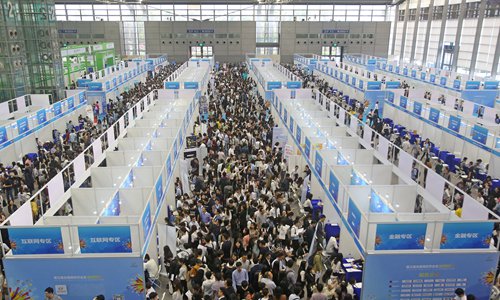
Job applicants attend a job fair in Shenzhen, South China's Guangdong Province. (Photo: VCG)
The Guangdong-Hong Kong-Macao Greater Bay Area is trying to build its talent pool by rolling out favorable tax policies, which analysts said will boost the hub's growth amid China's pursuit of advanced technology and innovation.
To attract top talent from abroad and professionals who are in short supply, the amount of individual income tax surpassing 15 percent of the basis will be paid by local governments' subsidies, according to a notice issued by the Department of Finance of South China's Guangdong Province on Saturday. Individuals will be exempt from paying that portion of the tax, it said.
The notice was issued to the nine local governments in the province that are involved in the Greater Bay Area including Shenzhen, Dongguan and Zhuhai.
Consisting of the Hong Kong and Macao special administrative regions (SARs) and the nine cities in Guangdong, the area covers 56,000 square kilometers. It had a combined population of about 70 million at the end of 2017.
Wang Lixin, vice mayor of Shenzhen, told a forum in May that "if your annual salary is 1 million yuan ($145,600), now you only have to pay 150,000 yuan of income tax compared with the previous 450,000 yuan, saving 300,000 yuan."
"The policy adjustment is to offset tax differentials between the Chinese mainland and Hong Kong and Macao, providing a similar tax liability as professionals can enjoy in the SARs," said Mao Yanhua, a professor at the Institute of Guangdong, Hong Kong and Macao Development Studies at Sun Yat-sen University.
Based on the overall improvement of the business environment and strengthening support for innovation as well as strategic newly emerging industries, the Greater Bay Area is bound to lure and retain more brains, Mao told the Global Times on Sunday.
"Instead of saying that China is mining talent from Silicon Valley, I think that the change and prospects that China will offer will naturally attract top talent," said Mao.
Ma, a 29-year-old student from the mainland who's pursuing a master's degree in Hong Kong, told the Global Times on Sunday that Shenzhen is really developing very fast in terms of advanced technologies, and that's an area in which Hong Kong cannot compete with the moment.
"For a high-tech start-up, Shenzhen is currently a perfect choice. Besides, the city's home prices are affordable compared with Hong Kong," said Ma, who plans to work in Shenzhen when she graduates.
Ma also noted that compared with the tax relief incentives, it is the area's bright prospects that truly matter.


